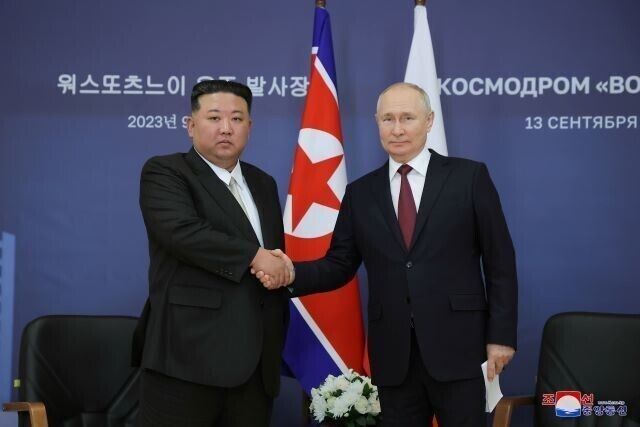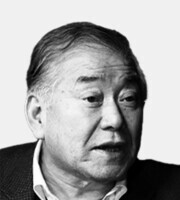hankyoreh
Links to other country sites 다른 나라 사이트 링크
[Column] Will Seoul’s ties with Moscow really recover on their own?


By Chung-in Moon, James Laney Distinguished Professor at Yonsei University
South Korea’s relations with Russia have been going from bad to worse since Yoon Suk-yeol became president. That’s partly the inevitable result of Russia’s invasion of Ukraine, but other significant factors are power politics between the US and Russia and Russia’s growing chumminess with North Korea.
Following the summit between Vladimir Putin and Kim Jong-un at the Vostochny Cosmodrome, in the Russian Far East, last September, the two countries have been visibly engaging in military cooperation and holding meetings between high-level officials. For South Korea, those are truly troubling developments.
The current awkwardness of Seoul-Moscow relations was made clear by a verbal spat between their respective foreign ministry spokespeople in early February. After Yoon Suk-yeol remarked that North Korea is “the world’s only country to have codified a preemptive nuclear strike in law,” the spokesperson of the Russian Ministry of Foreign Affairs said that Yoon’s remarks were “blatantly biased” and “odious” as well as “designed to obscure aggressive plans as regards the DPRK.” South Korea’s Ministry of Foreign Affairs then slammed the Russian spokesperson’s remarks as being “unbecoming sophistry that is both churlish and hateful.”
Russia also vetoed a motion to extend the mandate of an expert panel under the authority of the UN Security Council Sanctions Committee on North Korea in a plenary session of the Security Council on March 28.
Concerns have been raised that the recent degradation of Seoul-Moscow relations is due to the Yoon administration’s excessively pro-Western foreign policy bias, but national security adviser Chang Ho-jin expressly rejected that in an interview with KBS on April 27.
“We’re maintaining stability in our relations with Moscow based on international norms. Barring the emergence of an external factor, such as the accelerated formation of geopolitical blocs, it will be possible to restore Seoul-Russia relations after the war in Ukraine,” Chang said, offering an optimistic prognosis.
Russian government officials and Korea experts I met at the 2024 Moscow Nonproliferation Conference, around the time of Chang’s comments, held the same view as Chang.
Since economic cooperation with South Korea is critical for Russia’s economic development, there have been continuing calls to quickly normalize relations between the two countries. Automobiles produced by Hyundai and Kia are extremely popular in the Russian market, and the Lotte Hotel, where I stayed for the conference, has long been considered Moscow’s finest. And while the Russian government has officially added South Korea to its list of “unfriendly” countries, Russians continue to hold positive feelings about South Korea.
That said, the Russian officials and Korea experts listed the following minimum conditions for a future rapprochement between the two countries.
First, South Korea must not provide lethal weapons to Ukraine since that would force Russia to regard it with hostility.
Second, South Korea must not interfere in Russia’s improving ties with North Korea with the proviso that Russia’s cooperation with North Korea will be limited to basic necessities and energy products. Russian officials took pains to stress that Russia wouldn’t do anything to disturb the South Korean government, such as providing the North with cutting-edge military technology.
Third, if South Korea joins any sanctions regimes against Russia, Russia will have no choice but to take corresponding measures. My Russian contacts suggested that South Korea should take the kind of flexible attitude toward sanctions against Russia that Japan has.
The Russians also expressed serious reservations about South Korea’s independent sanctions and about Samsung Heavy Industries’ suspension of the production of hull blocks and tools and materials for 10 out of 15 liquefied natural gas tankers that it has contracted to build for a Russian shipyard — though Samsung has not officially canceled that contract yet.
The Russians were very put out by the cancellation of a show in Korea that would have featured dancers from Russia’s Bolshoi Ballet. They strongly emphasized the need to continue exchange on a social, cultural and person-to-person level.
While the question of whether Korea is providing lethal weapons to Russia’s enemies will fade after the war in Ukraine, the issues of Russia’s stronger ties and military cooperation with North Korea will continue even after the war. Trust between South Korea and Russia isn’t high enough to take Russia’s verbal assurances at face value.
Furthermore, these issues are complicated by the marked difference between the two countries’ perspectives on the North Korean nuclear issue. The Russian government is critical of the frequency and intensity of South Korea’s joint military exercises with the US, of the deployment of US strategic weapons on the Korean Peninsula, and of the Korean government’s development of its “kill chain” preemptive strike platform. Nor have the Russians bothered to conceal their keen anxiety over strengthening military cooperation between South Korea, the US and Japan.
Russia hasn’t cooperated with South Korea and the US on their existing sanctions regime against North Korea. Russia tends to regard sanctions against North Korea and sanctions against itself as part of the same package, leaving Seoul with even less wiggle room.
In the end, it’s too optimistic to expect that it will be possible to restore Seoul-Moscow relations once the war in Ukraine has concluded. The decay of inter-Korean relations and US-Russia relations has become a major obstacle, and there’s little chance of a turnaround in either of those relationships.
One thing that’s certain is that these diplomatic challenges can’t be resolved by a US-oriented pro-West policy alone.
Alongside South Korea’s big-picture foreign policy direction, we also need a more granular approach for individual countries that’s based on an accurate understanding of those countries. Integrating that kind of detail-oriented thinking is what’s needed to make the Yoon administration’s foreign policy goals more compelling.
Please direct questions or comments to [english@hani.co.kr]

Editorial・opinion
![[Column] Is Korean democracy really regressing? [Column] Is Korean democracy really regressing?](https://flexible.img.hani.co.kr/flexible/normal/500/300/imgdb/original/2024/0705/2917201664129137.jpg) [Column] Is Korean democracy really regressing?
[Column] Is Korean democracy really regressing?![[Column] How tragedy pervades weak links in Korean labor [Column] How tragedy pervades weak links in Korean labor](https://flexible.img.hani.co.kr/flexible/normal/500/300/imgdb/original/2024/0703/8717199957128458.jpg) [Column] How tragedy pervades weak links in Korean labor
[Column] How tragedy pervades weak links in Korean labor- [Column] How opposing war became a far-right policy
- [Editorial] Korea needs to adjust diplomatic course in preparation for a Trump comeback
- [Editorial] Silence won’t save Yoon
- [Column] The miscalculations that started the Korean War mustn’t be repeated
- [Correspondent’s column] China-Europe relations tested once more by EV war
- [Correspondent’s column] Who really created the new ‘axis of evil’?
- [Editorial] Exploiting foreign domestic workers won’t solve Korea’s birth rate problem
- [Column] Kim and Putin’s new world order
Most viewed articles
- 1Real-life heroes of “A Taxi Driver” pass away without having reunited
- 2Former bodyguard’s dark tale of marriage to Samsung royalty
- 310 days of torture: Korean mental patient’s restraints only removed after death
- 4[Column] Is Korean democracy really regressing?
- 5S. Korea “monitoring developments” after report of secret Chinese police station in Seoul
- 6South Koreans living near border with North unnerved by return of artillery thunder
- 7What will a super-weak yen mean for the Korean economy?
- 8[Column] How opposing war became a far-right policy
- 9Koreans are getting taller, but half of Korean men are now considered obese
- 10S. Korea ranks 7th from bottom in happiness among OECD member states